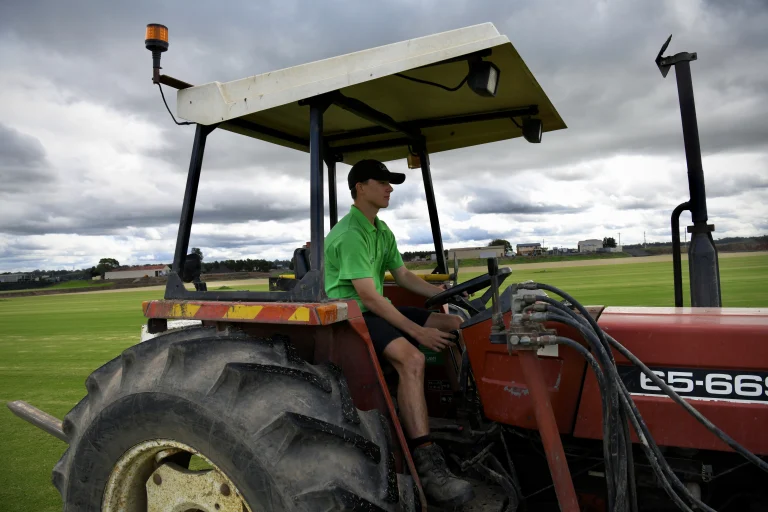Like most 14-year-olds, Ryan Konowec is on school holidays. But unlike most of his classmates, he is spending his holidays working four days a week at a turf farm northwest of Sydney.
“When you’re back in school, it makes you more concentrated because you know what hard work is like,” he said.
His job involves wrapping palettes, weeding and moving products for shipment. He is working to save up for a car.
Konowec was hired late last year at Greener Lawn in Freeman’s Reach to fill a workforce shortage. His employer, Anthony Muscat, needs 12 employees and currently only has seven.
“We didn’t have much choice. We advertise for positions and no one turns up, or they don’t want to work the hours or do labouring work,” Muscat said. So, he turned to Konowec, the son of an employee, for an extra pair of hands.
“He’s a very switched-on kid [and] a good learner,” Muscat said.
But hiring a young worker came with limitations. Under NSW laws, Konowec is restricted on how many hours he can work and the kind of labour he can do, and cannot operate heavy machinery or drive a forklift.
There are an estimated half a million children aged under 17 working across Australia. About 214,500 kids aged 11 to 15 worked at some point in the 2022 financial year, and 367,100 kids aged 15 to 17 were employed as of August 2022.
The Australian Bureau of Statistics does not keep detailed data on those employed under the age of 15, and can only provide estimates.
Small Business Australia Executive Director Bill Lang said unemployment remained steady at 3.5 per cent and employers were struggling to find skilled workers.
An increasing number of small businesses rely on younger family members to help fill workforce shortages.

Last week a cafe in regional NSW was criticised for employing children as young as 11 to make jams and relishes.
While recruiting family members to help out is not unusual for small businesses and farms, Lang warned that red tape and complicated legislation were making it difficult for business owners to legally employ young staff.
“One of the top things that small businesses are looking for from all levels of government is a reduction in red tape,” Lang said.
Regulations vary from state to state. In WA, children can work from 10 to 12 years old if they are fully supervised with permission from their parents, or for any age within a family business or the entertainment industry.
NSW, South Australia, Tasmania and the Northern Territory do not have a minimum age to work, with exceptions around how many hours can be worked in certain industries and age brackets.
In Victoria, businesses need to apply for a permit to employ children under the age of 15. In the 2021-22 financial year, 7758 of these permits were issued. Wage Inspectorate Victoria commenced seven prosecutions across the past 18 months for child employment breaches.
There’s no Commonwealth legislation governing the minimum age for employment or work in Australia.
In March, a parliamentary committee report was tabled recommending that Australia ratify the International Labour Organisation convention concerning the minimum age for admission to employment. Australia is one of only a handful of countries yet to do so.
The convention would specify the minimum age of finishing compulsory schooling – which states and territories currently do – and set a minimum working age of 15, make 18 the minimum age for hazardous work or 16 with protections in place, and specify the conditions for children no younger than 13 years to undertake light work.
Committee chair Josh Wilson said ratifying the convention would strengthen Australia’s “credibility when it comes to promoting strong measures to eliminate child labour in the Asia-Pacific”.
But Lang warned the convention could further complicate things for small businesses which often do not have dedicated human resources staff. Lang believes there should be a simplified small business award rate to make things “simpler and fairer”.
Youth Law Australia senior solicitor Anastasia Coroneo warned that young employees were also at greater risk of exploitation.
“We know that young workers are particularly vulnerable in the workplace because they may not be aware of their rights or have the experience of life to navigate the significant power imbalance in the employee/employer relationship,” she said.
Key concerns were around young workers being asked to work “free trials,” being paid a “training wage” less than minimum wage without being enrolled in a traineeship or apprenticeship, withholding wages to prevent casual staff from resigning, and being told in advance their leave requests will be denied.
“Workers have rights that must be upheld, not just play second fiddle to expedient business practices,” she said.
Source : TheSydneyMorningHerald


